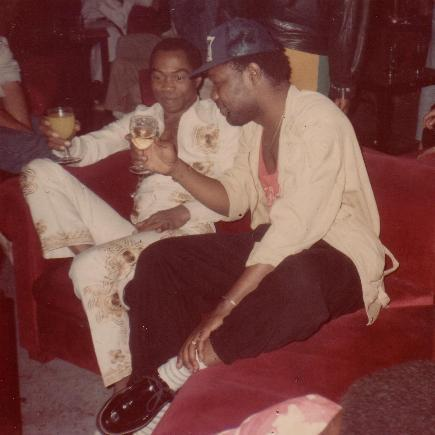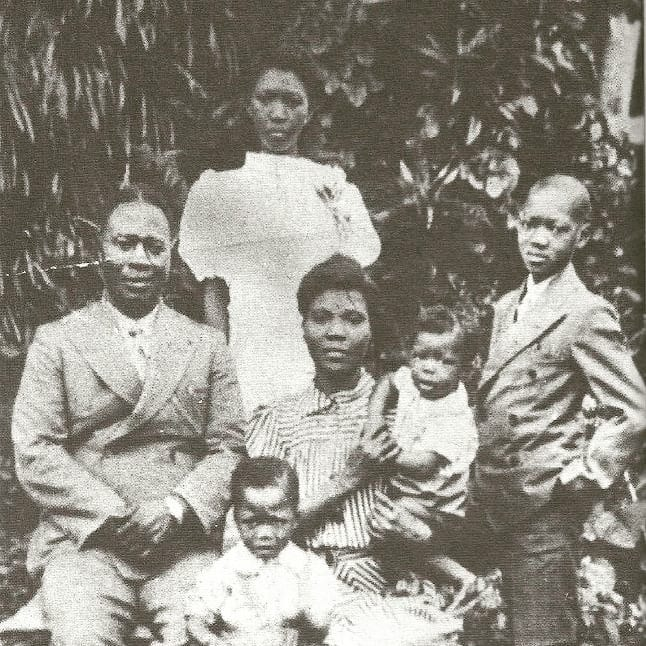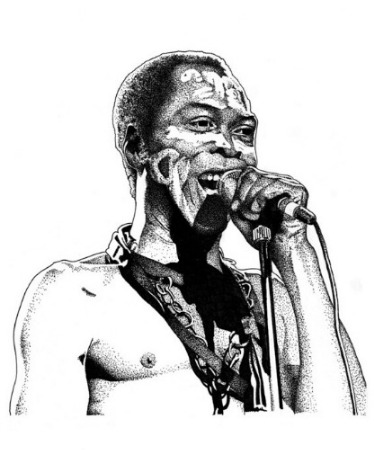Identifiable by its bold jazz and funk rhythms, instrumental solos, and highlife music, Afro Beat laid the foundation for what would become AfroBeats and give us artists such as Wizkid, Tiwa Savage, and Burna Boy. The man who coined the term of Afrobeat and is considered the father of this genre is Fela Kuti. Fela Kuti was a Nigerian artist and activist who was not afraid to use his voice to challenge authority and he pioneered a distinct sound from Africa. Fela’s music and style is unapologetic, bigger than life, and would inspire artists years after his death.

MOI MEME, CC BY-SA 3.0, via Wikimedia Commons
Fela Kuti was born Olufela Olusegun Olutotun Ransome-Kuti in 1938, Nigeria. Fela was born into a family where advocacy and creativity were cultivated. Family members such as his mother would have a huge influence on his music, and his ideology. Fela’s mother was Chief Funmilyao Ransome-Kuti who was a feminist activist in the anti-colonial movement. Nigeria at the time was a colony of England, and Chief Funmilyao was a prominent suffragist and member of the Nigerian Independence movement. Fela’s father was Reverend Israel Oludotun Ransome-Kuti, an Anglican minister and school minister. Reverend Israel was the first President of the Nigeria Union of Teachers, which was a Trade Union that aimed to improve the economic conditions of teachers and bring forth ideas from an educator’s perspective about the educational opportunities for the country.

Portrait of Fela Kuti’s family. Source Wikimedia commons
Fela had two other brothers who both ended up becoming doctors, and this was the route Fela initially was on. He had gone to London in 1958 intending to study medicine but realized his calling was elsewhere. Instead, Fela enrolled at the Trinity College of Music, where he studied playing different types of instruments. While in college, he started his band Koola Lobitos which played a fusion of jazz and highlife music. The band allowed him to test new sounds and styles which were successful for several years. The yearning for home was always present in him, however, and Fela moved back to Nigeria in 1963. While in Nigeria, he re-formed Koola Lobitos while also working as a radio producer for the Nigerian Broadcasting Corporation.
https://www.youtube.com/watch?v=usnznJZ0XvA&t=38s
While working as a radio producer he was still making music and weaving genres that were creating a sound that had never been heard before. Always on the lookout for inspiration, Fela traveled to Ghana. While in Ghana, he coined the term Afrobeat to describe his music. His music was a fusion of traditional Yoruba music, jazz, highlife, funk, and calypso. The sound was unique and strong, yet, soothing as it seeped into your bones and awakened your spirit. Fela took his new genre with him to the United States in 1969, where he spent 10 months. His time in the states had a huge impact on him as he was introduced to the Black Power movement through Sandra Izsadore, who was a member of the Black Panther Party. His time in Los Angeles fueled a lot of his political views which translated into the tone and direction of his music. Fela renamed his band Nigeria ‘70 while in the states and then again to Afrika ’70 upon returning to Nigeria.

Photo source: Flickr Commons
Fela started taking a more political stance in his music upon returning to Nigeria. He formed the Kalakuta Republic which served as a haven, recording studio, and commune which was independent of the Nigerian state. Fela also set up a nightclub at the Empire Hotel, called the Afrika Shrine where he would often perform traditional Yoruba ceremonies. The club and Kalakuta republic became legendary for its serial performances, unique music, and increasingly became a voice of dissent for the government. Fela was growing into a force and changed his name to Anikulapo which means, ‘he who carries death in his pouch’ which can be interpreted as one who is the master of their destiny. His popularity amongst the people however was not reflected in the ruling government and Kalakuta was the subject of many raids.
The animosity towards Fela would come to a boiling point when he released the album Zombie with Afrika ’70 in 1977. The album was an unfiltered, blistering attack on Nigerian soldiers and compared them to zombies mocking them for following orders no matter what the dire consequences were. The government reacted with a massive brutal raid on Kalakuta. 1000 soldiers swarmed the commune and forced themselves in, beating and raping people. Fela’s elderly mother was thrown from an upstairs window and would later die from her injuries. Fela himself was severely beaten close to death and the commune was razed.
Fela’s spirit could not be broken and he formed his short-lived political party, Movement of the People (MOP). The ideals of the party were very much like Fela’s in that they preached about pan-Africanism and Nkrumahism. He continued to point out the failings of the government through his music, dropping ITT (International Thief Thief) which focused on the negative impact multinational companies were having on Africa. Fela’s prosecution by the government also continued and in 1984 he was arrested and jailed on charges of currency smuggling. Various human rights groups, however, pointed out that his arrest was politically motivated and he was released after two years.
Fela continued making music until his death from complications related to AIDS in 1997. Even years after his death, his presence is still felt in music to this day. He left behind a blazing legacy that has only grown over time.
Powered by WPeMatico


